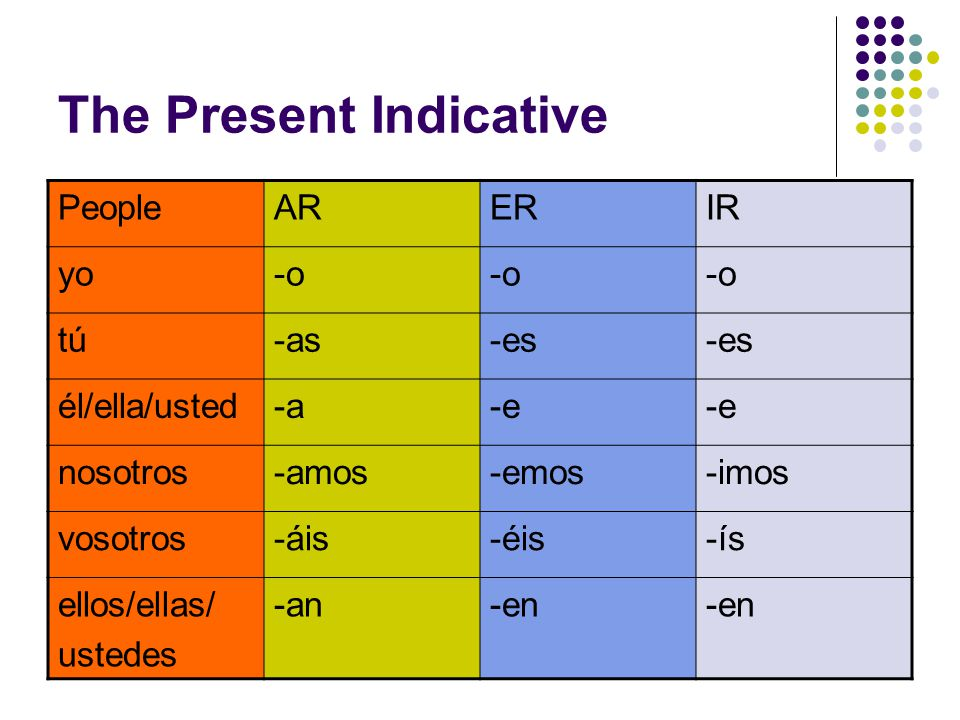present indicative
1/21
Earn XP
Description and Tags
THIS INFO FROM GCSE SPANISH GRAMMAR BOOKLET IN FOLDER
Name | Mastery | Learn | Test | Matching | Spaced | Call with Kai |
|---|
No analytics yet
Send a link to your students to track their progress
22 Terms
what is present indicative used to talk about
what u are doing now
what u do regularly
what things are like
e.g. I am doing my homework/ On Saturdays I go to the swimming pool/ Greece is beautiful
forming present indicative
o as a amos áis an
o es e emos éis en
o es e imos ís en

what are common irregulars in the present tense indicative
hacer (to do)
ser (to be - state)
tener (to have)
ir (to go)
estar (to be - place)
salir (to go out)
hacer (to do) conjugation present tense indicative
hago
haces
hace
hacemos
hacéis
hacen
ser (to be - state) conjugation present tense indicative
soy
eres
es
somos
sois
son
tener (to have) conjugation present tense indicative
tengo
tienes
tiene
tenemos
tenéis
tienen
ir (to go) conjugation present tense indicative
voy
vas
va
vamos
vais
van
estar (to be - place) conjugation present tense indicative
estoy
estás
está
estamos
estáis
están
salir (to go out) conjugation present tense indicative
salgo
sales
sale
salimos
salís
salen
what is the polite/formal form of “you” (applies to all tenses)
usted
querer
quiero quieres quiere queremos queréis quieren
cerrar to close
e-i
Cierro - I close.
Cierras - you close.
Cierra - he/she closes.
Cerramos - we close.
Cerráis - you close.
Cierran - they close
comenzar - to start
Comienzo - I start.
Comienzas - you start.
Comienza - he/she starts.
Comenzamos - we start.
Comenzáis - you start.
Comienzan - they start.
empezar - to begin
Empiezo - I begin.
Empiezas - you begin.
Empieza - he/she begins.
Empezamos - we begin.
Empezáis - you begin.
Empiezan - they begin
pensar to think
Pienso - I think.
Piensas - you think.
Piensa - he/she thinks.
Pensamos - we think.
Pensáis - you think.
Piensan - they think
nevar/helar
-nieva/hiela (it snows/it freezes) - both only used in 3rd person sing
what other verbs are also e-i (apart from vosotros and nosotros)
Merendar - to have a snack, to have a picnic.
Recomendar - to recommend.
Sentarse - to sit.
Negar - to deny.
what verbs change o-ue (apart from nosotros and vosotros)
sonar - to dream
encontrar - to find
aprobar - to approve
costar - to be difficult, cost
mostrar - to show
volar - to fly
recordar - to remember
colgar - to put
almorzar - to have lunch
encontrar - to find
probar - to try/taste
acordar - to agree on
contar - to count/tell
dar - to give
changes only in first person to doy, then after works like regular AR
esquiar
Esquío - I ski.
Esquías - you ski.
Esquía - he/she skis.
Esquiamos - we ski.
Esquiáis - you ski.
Esquían - they ski
confiar - to trust
Confío - I trust.
Confías - you trust.
Confía - he/she trusts.
Confiamos - we trust.
Confiáis - you trust.
Confían - they trust.
Continuar - to continue
Continúo - I continue.
Continúas - you continue.
Continúa - he/she continue.
Continuamos - we continue.
Continuáis - you continue.
Continúan - they continue.